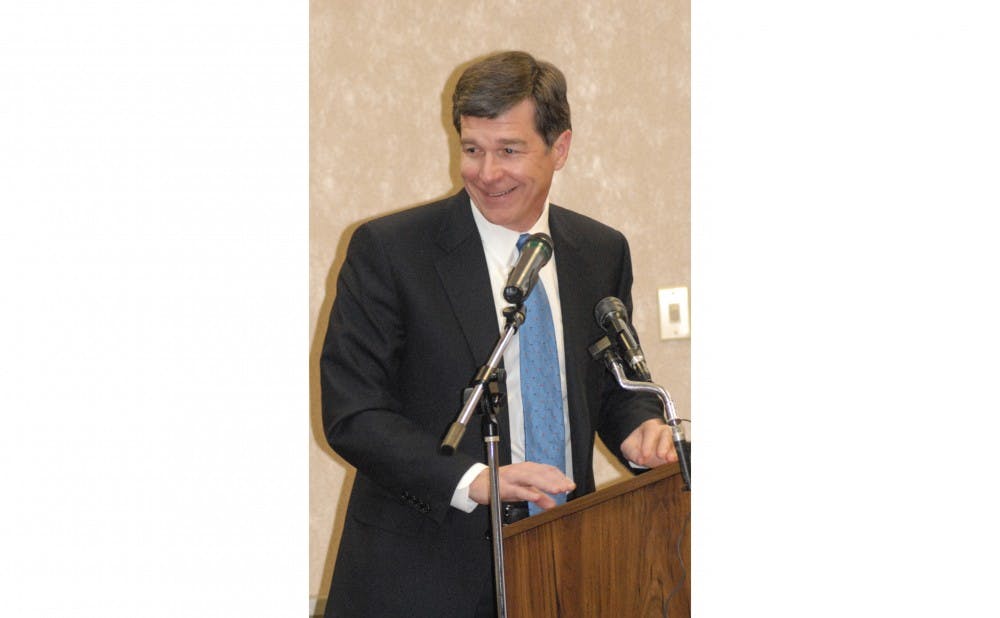Duke professors had mixed reactions about the legitimacy of new laws curbing Democratic Governor Roy Cooper's powers.
North Carolina’s General Assembly, which is dominated by Republicans, recently launched what some have described as a "legislative coup" by passing a string of bills that grant greater authority to the legislature. The bills effectively give control of State and County Boards of Elections to Republicans, change State Supreme Court elections to partisan races and curb Cooper’s power to appoint cabinet secretaries, state employees and trustees of the state's public universities.
The Republican-controlled legislature convened in mid-December in a surprise special session immediately after another special session meant to discuss relief efforts following Hurricane Matthew and mountain wildfires. The bills sparked Democratic outrage and public protests, generating a wave of legal challenges.
The special sessions also followed the resolution of the contentious gubernatorial race, in which Cooper beat former Republican Governor Pat McCrory. The Chronicle spoke to several Duke professors who shared their thoughts about the new legislation. Some felt that the recent bills were unprecedented in North Carolina’s political history.
“The Democrats took one or two steps to limit the power of the incoming Republican governor in 1972 and 1984, and the Lieutenant Governor in 1988, but the size and number of changes made by the Republicans this time is completely new,” said Mac McCorkle, associate professor of the practice in the Sanford School of Public Policy.
Robert Korstad, professor of public policy and history, also noted the unusual nature of the changes. Although shifts in administrative functions are normal with every transition from one political party to another, “what was done in the special session to really limit the prerogatives of Governor Cooper was unprecedented,” he said.
However, Michael Munger, professor of political science and director of the Philosophy, Politics and Economics certificate program, disagreed. In a column in the North State Journal, Munger recently penned a piece titled “The real Tarheel coup,” arguing that anger among Democrats is hardly justified.
“In 1976, after Jim Hunt was elected as Governor, the Democrats in the General Assembly passed legislation that authorized the immediate firing of everyone who had been hired to administrative positions in the past five years. This has come to be referred to as the ‘Christmas Massacre’ by Republicans,” Munger wrote.
John Aldrich, Pfizer-Pratt University professor of political science, shared similar sentiments. He recalled that the legislature would occasionally increase the power of the governor when the same party controlled both the executive and legislative branches.
“The reason that [decreasing the power of the governor] is rarer is that the Democrats had unified control of government, without interruption for 70-75 years in a row, so there was no need to change the power relationships for partisan purposes,” Aldrich wrote in an email.
The legislature's critics pointed to previous Republican efforts to secure partisan advantage since they took over in 2011. Some laws, such as legislation affecting voting procedures, have been struck down as unconstitutional.
McCorkle noted that there could be a "technical argument" made in the courts to undo the laws, as "it certainly seems unconstitutional, was improperly processed and rushed and severely lacks transparency."
“Neither [the session used to pass House Bill 2 nor the recent special session] were models of democratic deliberation,” McCorkle said.
Notwithstanding the technicality, McCorkle said he doubted the legislation as a whole could be challenged and thrown out like other laws have been.
“Here, I think specific challenges and specific points might be ruled unconstitutional but not the whole package,” he said.
Korstad noted that the changes to Boards of Elections may be successfully challenged in the courts.
“Courts are likely to see it as trying to restrict the rights and access to ballots of people, particularly voters of color, poorer voters and voters from rural areas, who don’t traditionally vote Republican,” Korstad said.
However, Aldrich wrote that he does not think such challenges are likely to be successful, even though the changes "may be very bad politics, for a democracy, representation and accountability.”
Moving forward, Aldrich explained that irrespective of the recently passed bills, Cooper’s power as a governor will remain weak.
“North Carolina has had one of the weakest governors in the nation from the very beginning [since] 1789. The governor did not have a veto at all until 1996, when Democrat Jim Hunt was governor," he said.
Despite the restrictions on his power, Korstad argued that Cooper, who had served as the state's Attorney General prior to taking office as governor, will be able to “utilize the governorship” effectively.
In fact, just before taking office, Cooper obtained a temporary injunction blocking the new legislation affecting his governorship pending further review in court. The case remains to be heard.
“I think Cooper will able to demonstrate responsibility that will probably be important in the next round of elections, and it’s really important for the Democrats to have the governorship as a foundation as they go ahead with the elections next fall or in 2018,” Korstad said.
Get The Chronicle straight to your inbox
Signup for our weekly newsletter. Cancel at any time.

